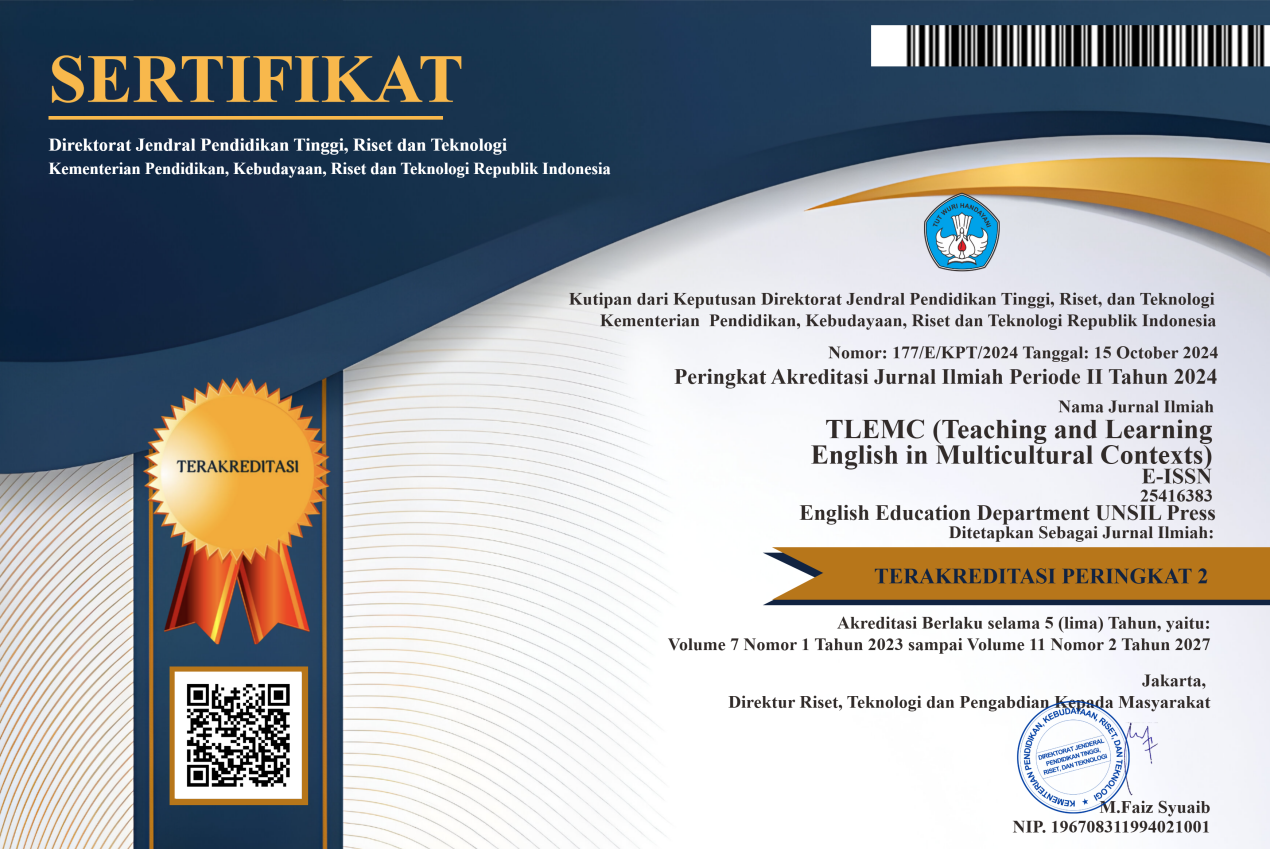Exploring Students’ Challenges and Strategies in Academic Writing: A Qualitative Study on the Talent Scouting Program
Abstract
The purpose of this research is to understand the students’ challenges and strategies when they are joining academic writing class on talent scouting program batch 2022 of UIN Salatiga. This research employs descriptive qualitative research model by involving 25 students who joined talent scouting program batch 2022 of UIN Salatiga. The instruments used questionnaire and interviews in order to obtain the data. The data were analyzed and interpreted through qualitative procedure. The research finds that the students face challenges; lack of vocabularies, grammar mastery, choosing correct words, motivation, and presenting clear idea. Writing weakness and negative environment are also part of the issues. The findings also showed the students’ strategies to confront those challenges such as the social strategies, memory strategy, compensatory strategies, metacognitive strategies, cognitive strategy, and affective strategies. From the result, it can be concluded that students from different majors joining the academic writing class were struggled to learn and meet the requirement of academic writing, so they are advised to allocate more time in self-regulated learning outside of the classes.
Keywords: Academic writing, Challenges, Strategies.
Full Text:
PDFReferences
Abbas, M. F. F. (2015). Analysis of students’ ability in writing a research proposal. ELT-Lectura, 2(2), 44-48.
Akbar, & Usman. (2009). Metode penelitian sosial. Jakarta: Bumi Aksara.
Alharbi, M. A. (2019). EFL university students' voice on challenges and solution in learning academic writing. Indonesian Journal of Applied Linguistics, 8(3). http://dx.doi.org/10.17509/ijal.v8i3.15276
Ankawi, A. (2015). The academic writing challenges faced by Saudi students studying in New Zealand. New Zealand: Auckland University of Technology.
Bailey, S. (2011). Academic writing: A handbook for international students (3rd ed.). New York: Routledge.
Barret, D. (2006). Strong communication skills a must for today’s leader. Rice University.
Bian, X., & Wang, X. (2016). Chinese EFL undergraduates' academic writing: Rhetorical difficulties and suggestions. Indonesian Journal of Applied Linguistics, 6(1). http://dx.doi.org/10.17509/ijal.v6i1.2645
Bloomfield, L. (1914). An introduction to the study of language. New York: Henry Holt and Company.
Bryman, A. (2016). Social research methods. Oxford University Press.
Brown, H. D. (2000). Teaching by principles: An interactive approach on language pedagogy (2nd ed.). London: Longman.
Chien, S. C. (2012). Students’ use of writing strategies and their English writing achievements in Taiwan. Asia Pacific Journal of Education, 32(1), 93-112. http://dx.doi.org/10.1080/02188791.2012.655240
Creswell, J. W. (2009). Research design: Qualitative, quantitative, and mixed methods approaches. California: SAGE Publications, Inc.
Creswell, J. W. (2014). Research design: Qualitative, quantitative, and mixed methods approaches. California: SAGE Publications.
Fitriyanti, E. (2021). Students’ perception of learning writing skills using google form during e-learning. Graduating Paper: IAIN Salatiga.
Flower, L., & Hayes, J. R. (1981). A cognitive process theory of writing. College Composition and Communication, 32(4), 365-387. https://doi.org/10.2307/356600
Gestanti, R. A. (2017). Listening strategies employed by non-English department students. Journal on English as a Foreign Language, 7(1), 35-58. http://dx.doi.org/10.23971/jefl.v7i1.485
Hismanoglu, M. (2000). Language learning strategies in foreign language learning and teaching. The Internet TESL Journal, 6(8).
Hogue, A., & Oshima, A. (2007). Introduction to academic writing (3rd ed.). New York: Pearson Education Longman.
Lee, C. K. (2010). An overview of language learning strategies. ARECLS, 132-152.
Mestari, S. (2016). The use of authentic materials in teaching grammar for EFL students (teachers’ perspective), LLT Journal, 19(2)
Moleong, L. J. (2000). Metodologi penelitian kualitatif. Bandung: PT Remaja Rosdakarya.
Oxford, R. (2003). Language learning styles and strategies: An overview. Oxford: GALA.
Oxford, R., & Burry-Stock, J. A. (1995). Assessing the use of language learning strategies worldwide with the ESL/EFL version of the Strategy Inventory for Language Learning (SILL). System, 23(1), 1-23. https://doi.org/10.1016/0346-251X(94)00047-A
Pongsukvajchakul, P. (2021). Language learning strategies used in English writing by Thai undergraduate students. Shanlax International Journal of Education, 9(2), 54-59. https://doi.org/10.34293/education.v9i2.3626
Qasem, F. A. A., & Zayid, E. I. M. (2019). The challenges and problems faced by students in the early stage of writing research projects in L2, University of Bisha, Saudi Arabia. European Journal of Special Education Research, 4(1). http://dx.doi.org/10.5281/zenodo.2557036
Silva, T. (2007). How to write a lot: A practical guide to productive academic writing. Washington, DC: American Psychological Association.
Stokoe, C. (2020). Improve your writing skills - a step-by-step guide to compelling content creation. London, UK: Kogan Page Publishers.
Strunk, W., & White, E. B. (2009). The elements of style. New York, NY: Penguin Books.
Sugiyono. (2010). Metode penelitian pendidikan pendekatan kuantitatif, kualitatif, dan R&D. Bandung: Alfabeta.
Thurman, S. (2003). The only grammar book you'll ever need: A one-stop source for every writing assignment. Avon, MA: Adams Media.
White, R., & Arndt, V. (1991). Process of writing. London: Longman Group. Ltd.
Whitaker, A. (2009). Academic writing guide: A step-by-step guide to writing academic papers. Slovakia: City University of Seattle.
Williams, J. M., & Colomb, G. G. (2010). Style: Lessons in clarity and grace. New York, NY: Longman Publishers.
Yulianti, D. B. (2018). Learning strategies applied by the students in writing English text. Journal on English as a Foreign Language, 8(1), 19-38. http://dx.doi.org/10.23971/jefl.v8i1.583.
Zinsser, W. (2016). On writing well: The classic guide to writing nonfiction. New York, NY: HarperCollins Publishers.
DOI: https://doi.org/10.37058/tlemc.v8i1.10022
Refbacks
- There are currently no refbacks.
INDEXED BY:
This work is licensed under a Creative Commons Attribution-NonCommercial-ShareAlike 4.0 International License.
![]()
TLEMC (Teaching and Learning English in Multicultural Contexts)
Program Studi Pendidikan Bahasa Inggris
Fakultas Keguruan dan Ilmu Pendidikan
Universitas Siliwangi
Jl. Siliwangi No. 24 Kota Tasikmalaya - 46115
email: tlemc@unsil.ac.id





